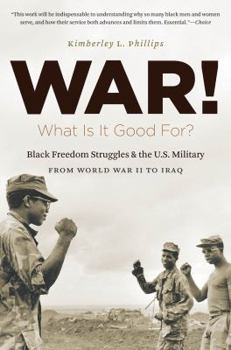War! What Is It Good For?: Black Freedom Struggles and the U.S. Military from World War II to Iraq
Select Format
Select Condition 
Book Overview
African Americans' long campaign for "the right to fight" forced Harry Truman to issue his 1948 executive order calling for equality of treatment and opportunity in the armed forces. In War What Is It Good For?, Kimberley Phillips examines how blacks' participation in the nation's wars after Truman's order and their protracted struggles for equal citizenship galvanized a vibrant antiwar activism that reshaped their struggles for freedom.
Using an array of sources--from newspapers and government documents to literature, music, and film--and tracing the period from World War II to the Iraq and Afghanistan wars, Phillips considers how federal policies that desegregated the military also maintained racial, gender, and economic inequalities. Since 1945, the nation's need for military labor, blacks' unequal access to employment, and discriminatory draft policies have forced black men into the military at disproportionate rates. While mainstream civil rights leaders considered the integration of the military to be a civil rights success, many black soldiers, veterans, and antiwar activists perceived war as inimical to their struggles for economic and racial justice and sought to reshape the civil rights movement into an antiwar black freedom movement. Since the Vietnam War, Phillips argues, many African Americans have questioned linking militarism and war to their concepts of citizenship, equality, and freedom.
Using an array of sources--from newspapers and government documents to literature, music, and film--and tracing the period from World War II to the Iraq and Afghanistan wars, Phillips considers how federal policies that desegregated the military also maintained racial, gender, and economic inequalities. Since 1945, the nation's need for military labor, blacks' unequal access to employment, and discriminatory draft policies have forced black men into the military at disproportionate rates. While mainstream civil rights leaders considered the integration of the military to be a civil rights success, many black soldiers, veterans, and antiwar activists perceived war as inimical to their struggles for economic and racial justice and sought to reshape the civil rights movement into an antiwar black freedom movement. Since the Vietnam War, Phillips argues, many African Americans have questioned linking militarism and war to their concepts of citizenship, equality, and freedom.
Format:Paperback
Language:English
ISBN:1469613891
ISBN13:9781469613895
Release Date:February 2014
Publisher:University of North Carolina Press
Length:360 Pages
Weight:1.20 lbs.
Dimensions:0.9" x 6.4" x 9.2"
Customer Reviews
0 rating





